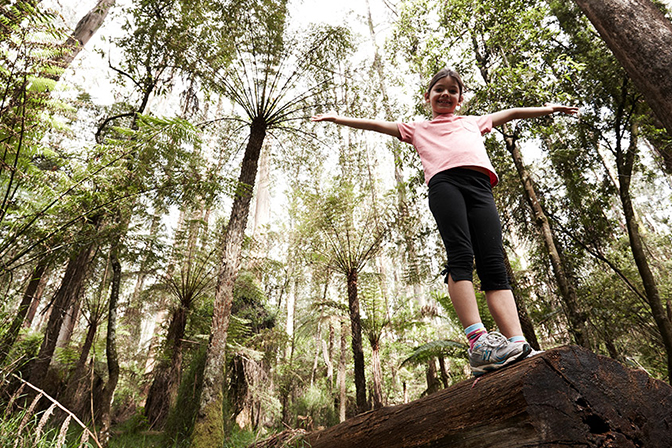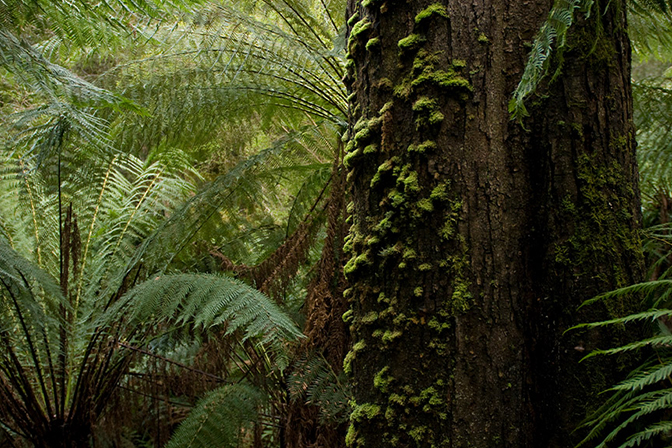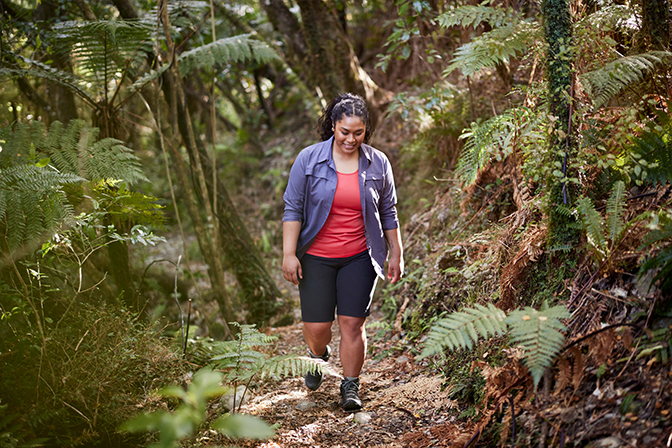If you’ve ever taken a stroll through one of Victoria’s tall forests, you might be familiar with the special sense of peace that comes with being immersed in nature. But did you know that the health benefits of spending time in our parks go far beyond simple relaxation?

How forest therapy helps support health and wellbeing
The growing field of forest therapy, which emerged from the Japanese practice of shinrin-yoku, or ‘forest bathing’, has nearly thirty years of medical research supporting its efficacy as a preventative health practice. Participating in guided forest therapy walks has been shown to regulate blood pressure, lower stress, support mental health and even boost the immune system.
President of the International Nature and Forest Therapy Alliance — Susan Joachim explains:
“Forest therapy is taking us back, reminding us of who we are as a species and the need to stay connected to nature. We are intrinsically connected to nature, even in the air we breathe. It’s in us – we just have forgotten that.”
What is forest therapy?
You might imagine that forest therapy would share a lot in common with a simple bushwalk – and in some ways, you’d be right. However, the practice is much more deliberate and detailed than taking a hike through the forest.
When you join one of Parks Victoria’s licensed tour operators on a guided forest therapy walk, you’ll be asked to turn off your mobile phone (or better yet, leave it at home); slow down to a very gentle stroll; and tune in to the forest, your senses, and your body’s response to the environment.
Your guide might take you through some gentle physical activities designed to centre yourself in the moment, and you’ll be encouraged to stop often: to touch the trees and plants, to breathe and taste the air, and to really take in the sounds and sights of the forest.
At the end of the walk, you’ll enjoy a Japanese-inspired bush tea ceremony, and have the chance to linger in the afterglow of your time spent intentionally engaging with nature.

Phytoncides: nature’s immune booster
Some of the most exciting benefits of forest therapy are due to volatile organic compounds that trees emit, called phytoncides. These compounds might sound like they’re straight out of science fiction, but their positive effects on the human immune system are supported by extensive medical research.
“Basically, the immune system of the forest is talking to our own immune system,” says Susan. “Those phytoncides help the forest to maintain its health and wellbeing. And when we slow down and immerse in nature, these same phytoncides talk to our immune system.”
In response to these compounds, the activity of immune system cells called natural killer cells (or NK cells) rises, along with overall immune function and production of anti-cancer proteins. It’s effectively an immune system booster, and all it takes is a few hours being guided through the forest.
There’s growing evidence that some of Australia’s native forest species have higher concentrations of phytoncides than anywhere else in the world – even more reason to get out into our beautiful tall forests and experience the benefits of forest therapy for yourself.

Better together: why a guide matters
As wonderful as it can be to spend time out in nature on your own, forest therapy works best when you have a guide.
“Any physical movement in a natural environment is good for us,” agrees Susan, but the practice is at its most effective when you are intentionally slowing down under the guidance of an experienced practitioner. Your guide’s role is to show you ways to engage with your environment, without imposing themselves on your experience. “It’s a very gentle way of connecting people to the medicine of the forest.”
Finding community through nature
Another great benefit of guided forest therapy sessions is the opportunity to connect with like-minded people – particularly important after the isolation many of us have experienced in the last 18 months.
“There’s a huge epidemic of loneliness,” says Susan. “We are all experiencing it. This loneliness epidemic is not only about mental strain – it does have a physical impact on us who go through long periods of loneliness.”
Many people who join forest therapy walks find a real sense of community with other nature lovers, and enjoy a kinship with nature and with each other.
If you’d like to try forest therapy, you can find certified practitioners providing services in Parks Victoria managed parks. Find registered operators on our website (filter by ‘Forest Therapy’).
There are many trails within the Parks Victoria estate which are suitable for experiencing forest therapy. Read more about where and how to try it at the Forest Therapy page.
Parks Victoria is a statutory authority of the Victorian Government and manages a diverse estate of parks and reserves, working to ensure access for all in a culturally sensitive and ecologically appropriate way. Macpac is the principal sponsor of Parks Victoria’s Junior Rangers program, aimed at encouraging kids to explore Victoria’s amazing parks with a real park ranger and through fun outdoor activities.



